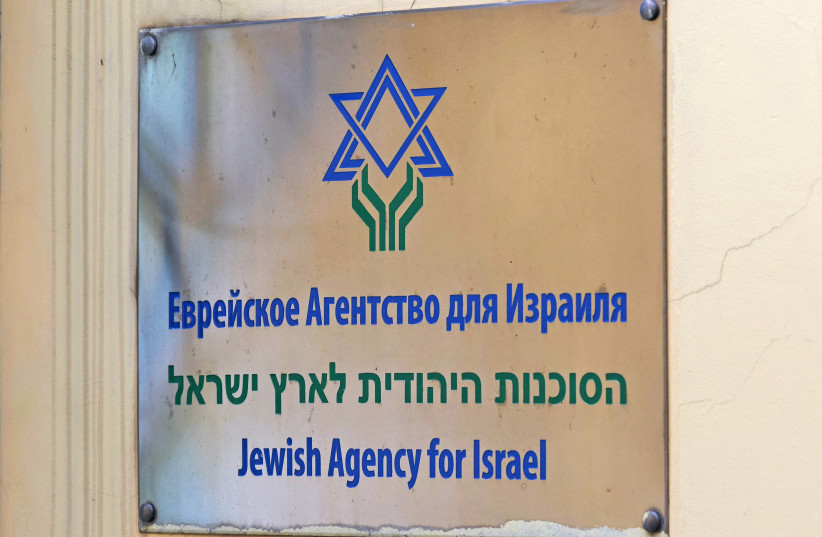The Israeli legal delegation to Russia is expected to meet with representatives of Russia's Ministry of Justice on Monday and discuss how the Jewish Agency in Russia will be able to operate according to the new privacy laws in the country. The Israeli delegation flew to Russia last week after receiving approval from Russia three days after requesting to embark.
Moscow’s Basmanny Court began considering a lawsuit on Thursday filed by the Russian Justice Ministry on the liquidation of the Jewish Agency office in Russia. The court hearing was set for August 19, and Thursday’s session was considered a preliminary hearing and pre-trial verification ended without any decision made.
A source in the agency explained that it was a “very technical issue,” yet “our lawyer was able to speak and make our case.” Shortly before the court session, the Israeli delegation of ministry legal advisers and senior officials from government ministries and the Jewish Agency arrived in Moscow to assist the Agency’s attorneys, even though they do not speak Russian and have no basic understanding of the Russian law system.
The Israeli delegation spent most of the day on Sunday at the Israeli Embassy in Moscow and prepared for tomorrow's meeting. A diplomatic source told The Jerusalem Post that the meeting will also include officials from Russia's Foreign Ministry and explained that "if the issue with the Jewish Agency would only be legal, there wouldn't be a need for anyone from the Foreign Ministry."
The delegation is headed by Tamar Kaplan, Foreign Ministry deputy legal adviser and its members include David Goldfarb, director of the Department of Diplomatic and Civil Law, Foreign Ministry, Roi Cohen, assistant legal adviser to the government, Dror Offen, chief of staff of the Aliyah and Integration Ministry, Michal Shetrit, legal adviser to the Aliyah and Integration Ministry, and Reuven Eidelman, legal adviser to the Authority for the Protection of Privacy. Representing the agency is Shay Felber, director-general of the Jewish Agency Integration and Aliyah Unit.

The Russian government has ordered the Jewish Agency to cease all operations inside the country, the Post revealed almost a month ago. The order was given in a letter received from the Russian Justice Ministry days beforehand. Officials in the agency confirmed that the letter was received and later also acknowledged that there was a threat of liquidation of the organization.
"Foreign agents"
Two weeks ago, Russia expanded its definition of "foreign agents," and it will now include "those who take part in any activity that authorities determine goes against Russia’s national interests or who receive support of any kind, not just money, from abroad," according to the Moscow Times. In this case, Jewish representatives from the Jewish Agency or representatives of international Jewish organizations may be categorized as "foreign agents."
According to the Moscow Times, which quoted the new law, "anyone who has worked with a 'foreign agent' or received funding from one will be included in a new Justice Ministry list of people and groups 'affiliated with foreign agents.'
“The Jewish Agency is a very rare example of an organization from abroad that has been working in Russia until now,” Rabbi Boruch Gorin, head of the Public Relations Department of the Federation of Jewish Communities in Russia told the Post last week. "There have also been Jewish organizations such as the KAF Foundation that was proclaimed as a foreign agent,” he said.
According to a Russian government site, “Charitable Foundation for the Development of Philanthropy,” KAF has been considered a foreign agent since 2022. The website says, “The reason for the recognition is unknown.” Gorin revealed a case from a few years ago in which “one of the hessed [charity] organizations in Russia was proclaimed a foreign agent.”
The organization is affiliated with the American Jewish Joint Distribution Committee. “Up until now, mainly the Jewish organizations with connections to other countries have survived and not been categorized as foreign agents, while most other international organizations have already been proclaimed as such,” Gorin explained. “The Jewish organizations in Russia looked to the average Russian as very important because they were allowed to operate while other institutions needed to leave the country. What is disturbing is that people feel that now the Jewish organizations are next in line.”
